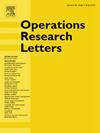Prophet upper bounds for online matching and auctions
IF 0.9
4区 管理学
Q4 OPERATIONS RESEARCH & MANAGEMENT SCIENCE
引用次数: 0
Abstract
In the online 2-bounded auction problem, we have a collection of items represented as nodes in a graph and bundles of size two represented by edges. Agents are presented sequentially, each with a random weight function over the bundles. The goal of the decision-maker is to find an allocation of bundles to agents of maximum weight so that every item is assigned at most once, i.e., the solution is a matching in the graph. When the agents are single-minded (i.e., put all the weight in a single bundle), we recover the maximum weight prophet matching problem under edge arrivals (a.k.a. prophet matching).
In this work, we provide new and improved upper bounds on the competitiveness achievable by an algorithm for the general online 2-bounded auction and the (single-minded) prophet matching problems. For the adversarial arrival order of the agents, we show that no algorithm for the online 2-bounded auction problem achieves a competitiveness larger than 4/11, while no algorithm for prophet matching achieves a competitiveness larger than ≈0.4189. Using a continuous-time analysis, we also improve the known bounds for online 2-bounded auctions for random order arrivals to ≈0.5968 in the general case, a bound of ≈0.6867 in the IID model, and ≈0.6714 in prophet-secretary model.
在线匹配和拍卖的先知上限
在在线2界拍卖问题中,我们有一个用图中的节点表示的物品集合和用边表示的大小为2的束。代理按顺序呈现,每个代理在包上都有一个随机的权重函数。决策者的目标是找到一个分配给最大权重的代理的捆绑,使得每个项目最多分配一次,即解决方案是图中的匹配。当agent是一心一意(即把所有的权重放在一个单独的bundle中)时,我们恢复边缘到达下的最大权重预测匹配问题(又称预测匹配)。在这项工作中,我们提供了一个新的和改进的竞争性上界,可以通过一个算法实现一般的在线2界拍卖和(一心一意)先知匹配问题。对于代理的对抗性到达顺序,我们证明了在线2界拍卖问题没有算法实现大于4/11的竞争,而预测匹配没有算法实现大于≈0.4189的竞争。利用连续时间分析,我们还将随机订单到达的在线2界拍卖的已知界在一般情况下提高到≈0.5968,在IID模型中提高到≈0.6867,在先知秘书模型中提高到≈0.6714。
本文章由计算机程序翻译,如有差异,请以英文原文为准。
求助全文
约1分钟内获得全文
求助全文
来源期刊

Operations Research Letters
管理科学-运筹学与管理科学
CiteScore
2.10
自引率
9.10%
发文量
111
审稿时长
83 days
期刊介绍:
Operations Research Letters is committed to the rapid review and fast publication of short articles on all aspects of operations research and analytics. Apart from a limitation to eight journal pages, quality, originality, relevance and clarity are the only criteria for selecting the papers to be published. ORL covers the broad field of optimization, stochastic models and game theory. Specific areas of interest include networks, routing, location, queueing, scheduling, inventory, reliability, and financial engineering. We wish to explore interfaces with other fields such as life sciences and health care, artificial intelligence and machine learning, energy distribution, and computational social sciences and humanities. Our traditional strength is in methodology, including theory, modelling, algorithms and computational studies. We also welcome novel applications and concise literature reviews.
 求助内容:
求助内容: 应助结果提醒方式:
应助结果提醒方式:


